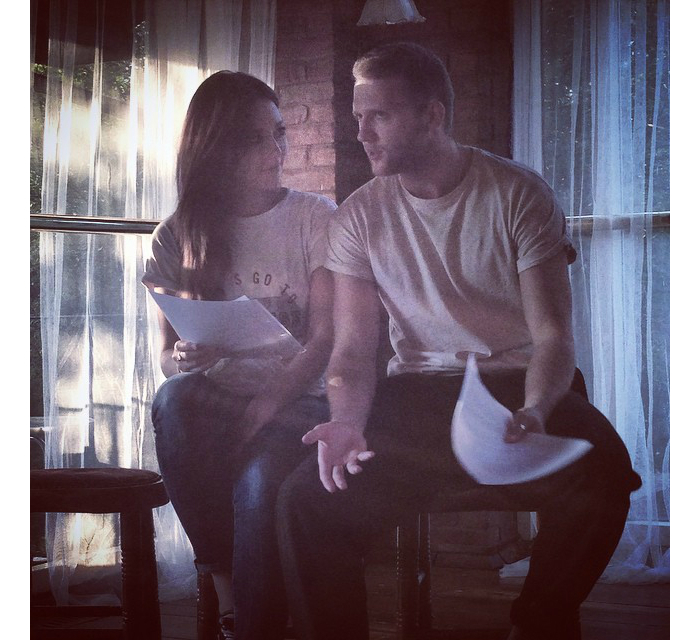As the 1956 Theatre gets ready to launch it’s latest production, Mamet’s Sexual Perversity in Chicago at Salford Arts Theatre, we speak to Amy-Jane Ollies, Artistic Director of Manchester’s 1956 Theatre about their latest work and the company itself.
You launch your new production Sexual Perversity in Chicago at Salford Arts Theatre next week, can you tell us a bit about it?
Yes, of course, It’s a really exciting piece and – as far as we’re aware – it hasn’t been performed in Manchester before. The play was written by award-winning playwright David Mamet and first performed in 1974, for anyone unfamiliar with the play, or indeed its author, the writing is just brilliant. Its typical Mamet; the dialogue is fast-paced, witty, over-lapping, cynical – brutal in places, hilarious in others. The action is, of course, set in Chicago in 1976 and explores the inner-workings of four twenty-somethings and their relationships with one another while they’re trying and, arguably, failing to make sense of it all.
What can audiences expect?
To stay on their toes. The story, not unlike the dialogue, moves along quickly and much about the characters is revealed during their verbal tennis matches with one another – so the audience can’t drop the ball. The characters and their opinions are unapologetically served and some of what is said will perhaps appear shocking to a more contemporary audience. The script has everything – humour, truth, romance, controversy and – for us actors – its incredibly interesting as it really carves open the brutal nature of humans and what we’re capable of doing to one another.
What are the biggest challenges in putting on a production such as Sexual Perversity in Chicago?
Well, this is the first time we’ve produced a published play as a company – we’ve performed adaptations of works already in existence that are in the public domain – Great Expectations, Little Women etc and of course have written our own plays but one of the challenges this time was applying for the rights to perform it but once we were given the green light the main challenge was, and usually is, marketing. Particularly with a play like Sexual Perversity as the title can be both enticing and off-putting depending on what people are expecting to see. We’re always keen to attract newcomers to the theatre – not just fellow actors, producers, directors but people who simply enjoy theatre and will be entertained by the production and take something away from it – so getting the marketing right is a key part of the process for us.
How do you set about choosing your productions?
1956 Theatre have always put heavy emphasis on story-telling and producing quality work which will ignite something in an audience so we’ve been keen to produce broad-ranging work to ensure we don’t become defined by a particular theme or style of performance but by the quality of work itself. Everything we’ve produced to date has had its own set of challenges and has been rewarding in different ways – adaptations are a huge challenge as you’re essentially starting a script from scratch but with your characters and story already set – but you have the pleasure of knowing that your adaptation is completely different to anyone else’s interpretation. We’re also both writers and are constantly working on new writing behind the scenes but with an original piece comes extra pressure and added responsibility – a huge amount of work produced on the Fringe is new writing so it is important to us to perfect and hone our work before putting it out before an audience. When it comes to selecting a new project – either a play or a text to adapt – we both read a lot anyway and will usually have compiled a shortlist of potential projects but then tend to go with our gut– if it feels right, it usually is.
What was the decision process behind the launch of the 1956 Theatre?
It was a natural progression after graduating University – we’re both working actors and as the industry is often unforgiving and unpredictable there can be months between jobs in which you have only two choices – wait for the phone to ring with the next opportunity or utilise the creative skills you perfected during your training and create your own work. It was really an easy decision to make – we relish the challenges of directing, writing and performing and it is the best way to stay practiced, focused and ‘ready’ in my opinion. An athlete between competitions would continue training to maintain peak fitness – for an actor it is no different. We’re also keen to promote and encourage the work of performers and creatives in the North and felt that setting up the company would offer further opportunities for actors outside of London. Admittedly, 1956 Theatre has now gone beyond ‘filling a gap’ between acting jobs – as a company we have enjoyed great support and critical success in the Manchester and Salford areas over the last two years and we’re looking forward to a busy 2015.

Amy-Jane Ollies, Artistic Director of the 1956 Theatre alongside Lee Lomas, Managing Director of the 1956 Theatre
What have been the biggest challenges in launching 1956 Theatre?
In the early stages I think a challenge any new production company will face is building a network, a reputation and generating the interest you require to promote your work. We were fortunate to sell out our first production ‘Dead On Arrival’ and we quickly achieved great reviews which immediately had impact – but it was our next production ‘Great Expectations’ which led to a huge boom in interest for the Company as a whole – we sold out the entire run and after an abundance of critical praise and 5 star reviews we definitely felt that we’d earned our reputation on the circuit as producers of quality theatre. We were also fortunate from the very beginning to work with very talented and passionate people – it does make a difference.
What comes next for 1956 Theatre after Sexual Perversity in Chicago?
Both Lee, our Managing Director, and I are currently working on new scripts so potentially our next project will be an original piece but we are, thankfully, both very busy with our individual careers at the minute as well and there’s always the possibility that a project may need to be put on hold for a few months…watch this space!
You have been involved in the whole process of putting on a show – from the writing or adapting through to the acting and directing. Which part of the process do you enjoy the most?
Difficult question…! Directing is tough – I enjoy having my say artistically in terms of how a production will look and the overall style of it but as for developing artists in their individual roles – honestly, I prefer working with actors who I trust intellectually and creatively to characterise and work off their own instincts as I’m an actor at heart and this is how I personally prefer to work. I’ve been performing since I was 9 – I was a dancer and have performed on stage from a young age so acting is obviously the most fulfilling part of the process for me but I was surprised at how rewarding writing can be. It’s always been a passion of mine but hearing your own writing out loud for the first time and seeing your own imagined world of characters come to life is something very special – I was quite overwhelmed at how much I enjoyed it.
Which play or work would you put on if you had carte blanche?
Unlimited funds! My goodness – I’d probably want to do the original piece I’m working on at the moment and really do it justice with a lavish set – the full works – all the things you often have to beg, steal or borrow when you’re producing low-budget work. As a performer though I would love to do a Musical – Musical Theatre is one of my first loves and if I could produce absolutely anything it would have to be something that would enable me to sing and dance and get totally lost in another world – West Side Story, Wicked, Blood Brothers…something like that.
Sexual Perversity In Chicago: The equal rights amendment is hot news. Bernie, Deborah, Danny and Joan are dictated by sex, manipulated by one another and grappling with what it is they’re actually searching for… is it the same thing? Mamet’s witty, heated dialogue between his four many-layered players is what makes Sexual Perversity in Chicago so mouth-wateringly moreish. Though it’s rather more savoury than sweet – the untangling of carnal desires will hook you in, swallow you up and spit you out.
Mamet’s play examines the sex lives of two men and two women in 1970s Chicago. Sharp, witty and at times caustic, it’s a production which has been adapted and reworked in various forms, both on stage (West End, Broadway and Off-Broadway) and on film, inspiring the 1986 and 2014 movies About Last Night.
Sexual Perversity in Chicago is the latest production from the 1956 Theatre and is set to run at the Salford Arts Theatre from 26th – 28th March.
You may also be interested in:
In Interview: Gabriella Cilmi
In Review: Crocodiles at the Royal Exchange Theatre
In Review: The Last Days of Troy at the Royal Exchange Theatre




